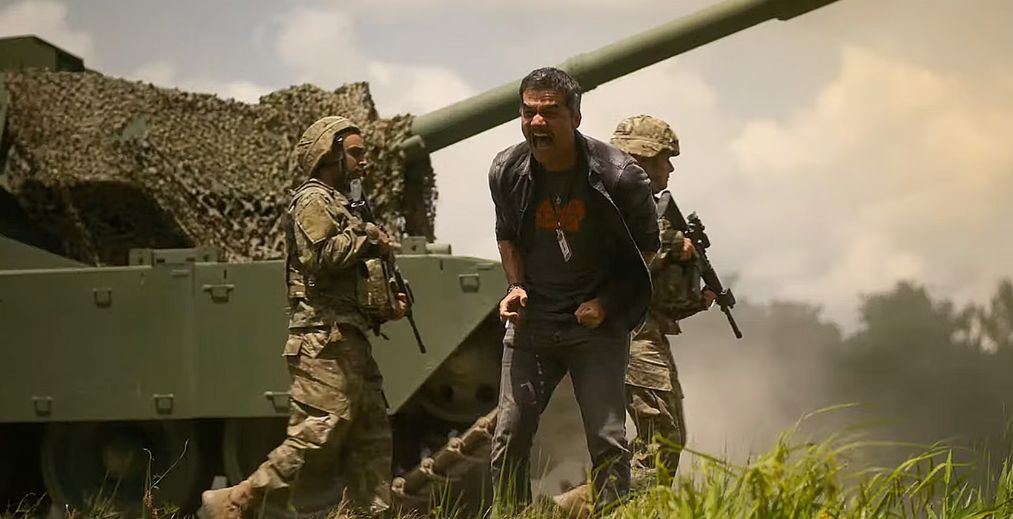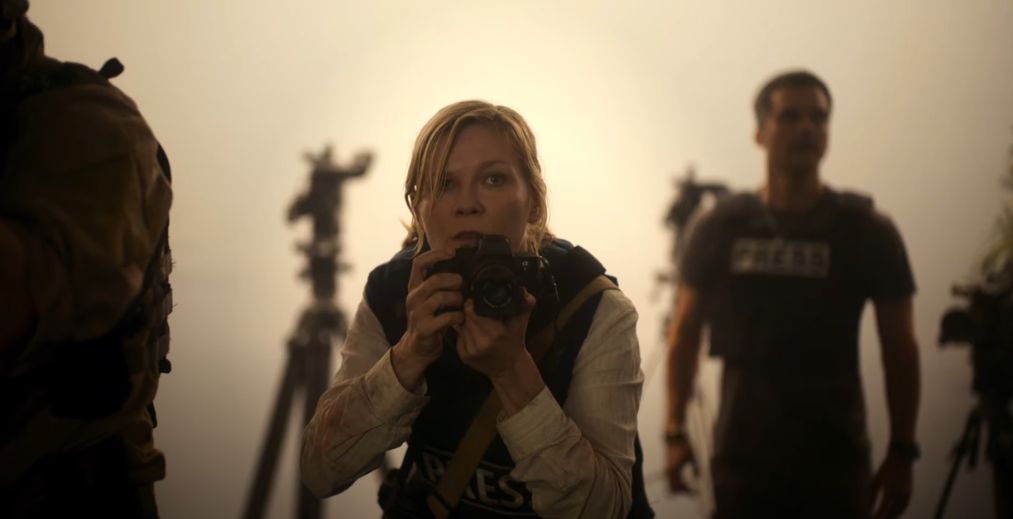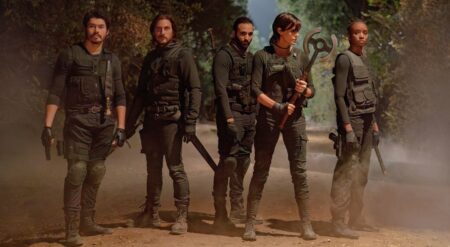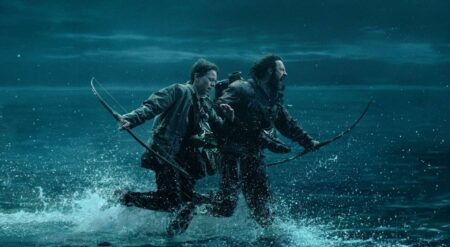In the trailers, writer-director Alex Garland’s Civil War (2024) looks like a popcorn flick. It seems loud and brash, but in reality, it’s more intimate. Civil War drops you into the end of the second American Civil War and explains nothing about how it happened. Instead, you follow Lee (Kirsten Dunst), a war photojournalist covering the war, and her writer colleague Joel (Wagner Moura) as they attempt to get the last great story: an interview with the President (Nick Offerman).
A road trip movie more than a war movie, Civil War (2024) follows the duo as they head to Washington D.C. to see the President as the end of the war approaches. Only, they’re joined by Sammy (Stephen McKinley Henderson), a veteran journalist too old to duck from bullets, and Jessie (Cailee Spaeny), a twenty-something who is looking to start in the profession.
Civil War is somehow grand in scale and intricately intimate in narrative. Garland delivers an action spectacle with explosions, choppers, and tanks. At the same time, he delivers a story about the importance of journalists, the danger of populism, and, ultimately, the impermanence of the person taking the picture. The film is beautiful in how it balances both. In each war scene, the film carefully tracks how journalists maneuver the battlefield.
They react and dive, and the camera tracks them from every point. Every shot they take is captured, and every explosion is in earshot. Maneuvering these battles is an organized chaos that is beautiful in motion. It is even more breathtaking in the photographs that the film presents from its sequences.
But at the heart of this exquisite exploration of battle are the characters. Dunst’s Lee doesn’t say much. She stares and builds walls around her. She’s broken in ways we don’t see, and Dunst brings that to the surface. When she does speak, it shakes the film. Cailee Spaeny, as Jessie, shows the wonder of watching journalists work. She is enamored with the job and moved to become like her hero, Lee.
However, as she’s consumed by it, she begins to lose that wonder. Wagner Moura’s Joel is a chaotic man moved by violence, and the goal is to capture it. He’s an adrenaline junkie looking for another hit. And Sammy, he’s the veteran, the father, the glue that holds them all together.
When Garland drops all of the audio, the pain of war is clear. When other filmmakers choose grand epic songs to accompany their visions of war, Garland chooses silence. He drops everything out and leaves only the screaming actors in their place. Screaming in silence, their faces contorting, war is not something to glamorize. It is something to avoid.
Civil War (2024) may have one flaw, but it does have bite.

The film’s primary fault is that Garland trusts his audience too much. He works hard to build a world where journalists are the heroes. However, the political commentary is less of a conversation and more of a Rorschach test. By leaving it up to the viewer, any strong point against war and the divisiveness of the United States feels empty.
Some moments point to his anti-populist message, like nods to the “Antifa Massacre” and the “greatest victory the world has ever seen.” However, he leaves gaps to allow any side of the political spectrum to see themselves. Sure, Nick Offerman‘s president is in his third term, but anyone can map something onto that.
As a Texan, I can see why Texas and California create the Western Forces. These are two states that have both thought of seceding and have the most resources in the United States (and the most military bases to boot). However, the political vision is too cavernous to form a complete message. But in a way, that’s the nature of journalism being under assault. As much as the right has attacked journalists, the current liberal White House has done nothing but denounce and hide journalists reporting on the current genocide occurring in Gaza.
In that way, Garland’s primary focus is on protecting journalists. The war itself is not as interesting as the towns the group visits or the animosity that the journalists face. There is no difference on either side. Everyone is trying to kill each other, and those attempting to just show the atrocities fall at the bottom.
I wanted more explanation of the politics of the war and I wanted to see Garland connect the Texas and California dots that I did. However, his vagueness can’t be seen as something horrible, so much as being the very specific thing that he isn’t interested in talking about. For viewers who are plugged in, this is a clear anti-populist film that pushes back against the American right. But Garland’s doesn’t push far enough.
Ultimately, Civil War (2024) is an overwhelming experience. It captures the importance of journalism but also the fragility of life on the frontline and how easy it is for someone to jump into the fray in your place—all to capture the shot. By choosing to come into the Civil War at the end of it, Alex Garland boldly chooses to simply use the War as a backdrop and let his characters carry his pro-journalist message loud and clear.
Civil War (2024) was screened as a part of the 2024 SXSW Film & TV Festival is streaming now on Prime Video.
Civil War (2024)
-
Rating - 8.5/108.5/10
TL;DR
By choosing to come into the Civil War at the end of it, Alex Garland boldly chooses to simply use the War as a backdrop and let his characters carry his pro-journalist message loud and clear.








